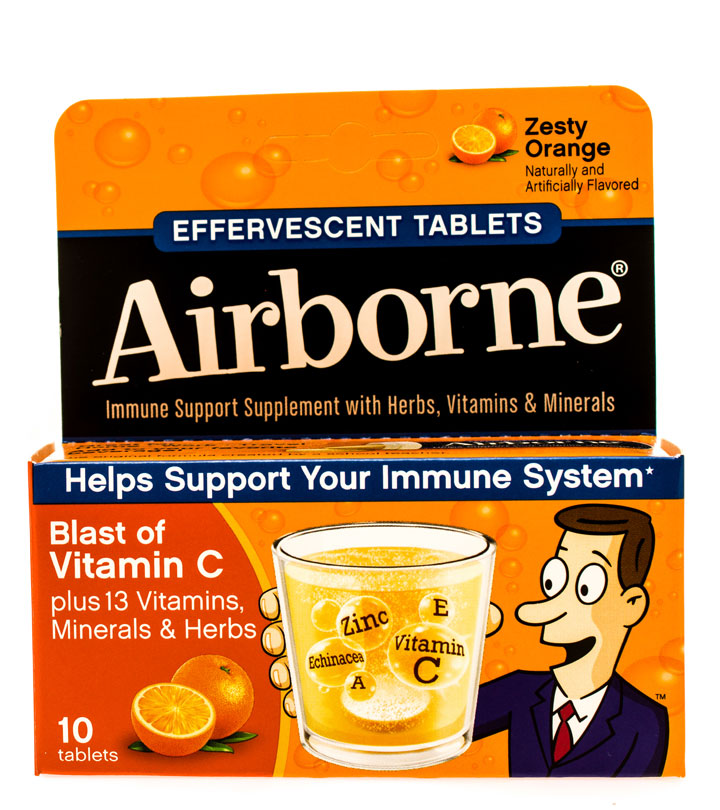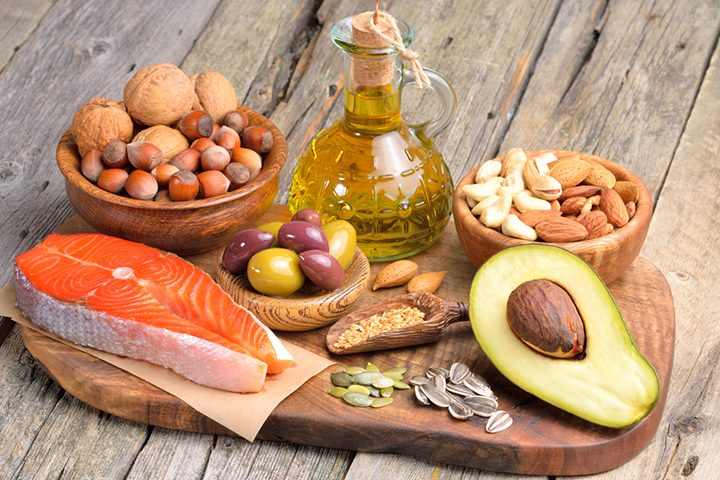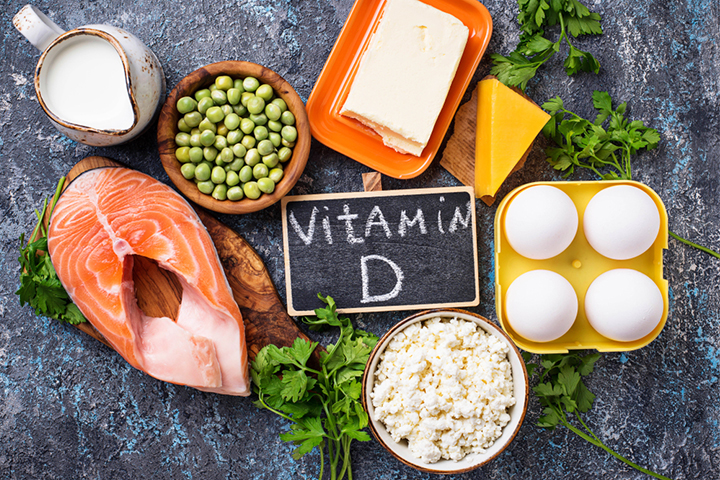Many lactating women are apprehensive about consuming Airborne when breastfeeding because they are unsure of its effects on their babies. Airborne is a dietary supplement that contains synthetic vitamins, antioxidantsiXMan-made or natural substances that may prevent or slow down cell damage caused due to harmful molecules called free radicals, amino acids, and many other nutrients. However, since it is a dietary supplement, it has not undergone extensive testing like drugs.
The effects of Airborne on lactating women and babies are not completely known; however, you must be aware of some concerns related to the use of this dietary supplement before consuming it. Moreover, you should also consult a doctor before using any supplement.
Read this post to know in detail about the safety of Airborne, the controversy and lawsuit related to it, and some useful dietary guidelines to follow during breastfeeding.
What Is Airborne?
Airborne is a dietary/herbal supplement. It contains synthetic vitamins (A, B2, C, and E), herbal extracts (ginger root extract, honeysuckle flower extract, Forsythia Vahl Flower extract, Echinacea Purpurea extract and Chinese Vitex) antioxidants, amino acids (lysineiXAn essential amino acid that is required for human health and is obtained from diet or supplements, glutamineiXThe most abundant amino acid in the body), minerals (zinc, selenium, magnesium, potassium, manganese, sodium), and many more ingredients like sucraloseiXA synthetic sweetener and sugar replacement, sorbitoliXA sugar alcohol with laxative and diuretic properties, and mineral oil. It is available in many forms such as powder, lozenges, gummies, effervescent tablets and drink mixes (1).
The Lawsuit And The Controversy About Airborne
For anyone wanting to use Airborne, whether while breastfeeding or otherwise, it may be helpful to know the controversy with the use of Airborne supplement that led to a big lawsuit (2).
The Finer Points
The makers of the formula claimed that Airborne was effective in the prevention and the treatment of the common cold. Lack of evidence in support of this claim was a big reason for the lawsuit. The lawsuit also mentioned Airborne’s lack of evidence in protecting users from germs. In fact, the name ‘Airborne’ points to the supplement’s efficacy in protecting users against air-borne germs (2).
- The lawsuit was brought about by the USA’s Federal Trade Commission (FTC). Other than FTC’s lawsuit, a US public interest organization called Center for Science in the Public Interest (CSPI) also challenged the claims made by the developers of Airborne.
- The class-action lawsuit was successful and in 2008, the company agreed to pay consumers a sum of $23.5 million. The company also agreed to pay additional funds of $6.5 million to settle a private lawsuit.
- After that, the company management began selling Airborne as a dietary supplement and not something that could protect users against the common cold.
Is It Safe To Take Airborne While Breastfeeding?
It is important to always check the safety of all active ingredients of a product while breastfeeding. It is also recommended to speak to your doctor and/or pharmacist as there are safe alternatives for most supplements and drugs on the market for when you are breastfeeding.
Other factors to take into consideration when looking at Airborne are as follows:
- Airborne has not been approved by the US Food and Drug Administration (FDA). Since it is sold as a supplement and not a drug, there are no legal requirements for its FDA approval. There is also not sufficient evidence that Airborne is useful for the immune system.
- Airborne contains many herbal extracts, whose safety during breastfeeding has not yet been proved in scientific literature. There is a great need for more research on herbs and it’s safety during breastfeeding.
- Regular use of Airborne may lead to an overdose of vitamin A. High doses of fat-soluble vitamins such as vitamin A can cause problems like dizziness, nausea, clumsiness, headache, liver problems and increased risk of osteoporosisiXA condition that weakens bones, increasing the chance of sudden, unsuspected bone fractures (3). If you are a nursing mother, it is important to inform your doctor and dietitian of all the supplements you are taking. Therefore ensuring that you are not exceeding the upper limit of some micronutrients.
Dietary Guidelines While Breastfeeding
It is recommended to follow a balanced diet containing a wide variety of foods while breastfeeding to ensure that you support your body nutritionally. Speak to your doctor or dietitian if you require extra vitamins and minerals.
Below are some general dietary guidelines that you can follow while breastfeeding. However, it is best to work with a registered dietitian for individual advice and guidance (2).
- Nursing mothers need healthy fats in their diet to support their bodily functions. The type of fat in your diet does impact the types of fat found in your breastmilk to some extent. Include eggs, dairy, poultry, and fatty fish such as cod and salmon in your diet. Increase your water and fluid intake (4).
- Avoid or limit caffeine and sugary drinks. The recommendation is to limit your consumption to 200 to 300mg per day. This is about 2 to 3 cups of instant coffee (4). Some babies might be more sensitive to caffeine, and others not. If your baby is sensitive, wait until your baby is a bit older (5).
- When breastfeeding, you need to consume more zinc, which you can source from nuts, poultry, beans, and milk. Airborne contains zinc, but it also contains other ingredients that have not been proven safe while breastfeeding. You also need more iodine when breastfeeding, and you can obtain this from eggs, milk, and seafood. For iron, eat more red meat, venison, chicken, seafood, and green leafy vegetables.
- Get your calcium from low-fat dairy products, legumes, almonds, and leafy greens. Not enough calcium in your diet can weaken your bones as your body will use your calcium content to ensure your baby receives enough in through your breast milk (5).
- Eat lots of fruits and vegetables to get adequate vitamins in your diet naturally. Eat berries and citrus fruits for vitamin C, which can boost your immunity. Eat carrots and pumpkin for your vitamin A needs and broccoli, spinach, and cabbage for your folate requirements.
- Vitamin D is also really important while nursing, especially in countries where sunlight is limited. Vitamin D can be found in eggs, oily fish, red meat, and some fortified fat spreads.
- If you consume a vegetarian diet, you may have concerns about your nutritional well-being while breastfeeding and may want to consider using a dietary supplement, especially if you do not have other vitamin B foods in your diet. Speak to your doctor or lactation consultant to find out about a suitable supplement. Using a supplement like Airborne does not contain all vitamins and minerals and cannot be used as a multivitamin and mineral supplement. You can get enough proteins, calcium, iron, and other minerals with vegetarian food options such as lentils, whole grains (bread, pasta, crackers), seeds, nuts, beans, vegetables, and fruits (4).
While eating a well-balanced diet is essential, you may need to complement your diet with a multivitamin, mineral, or other dietary supplements when nursing. Your registered dietitian will be able to assist you in determining your needs and provide additional recommendations tailored to you. However, there are several controversies and contraindications associated with Airborne, a dietary supplement. As a result, it’s unknown whether or not you can take Airborne while breastfeeding. So, before you decide to include Airborne or any other supplement or drug in general, consult your doctor or pharmacist about the safety of the active ingredients.
Key Pointers
- The controversial dietary supplement, Airborne, comprises synthetic vitamins, herbal extracts, antioxidants, minerals, and other nutrients.
- Some of the ingredients in Airborne, including Vitamin A, Echinacea, and Zinc, may cause adverse effects if taken in large amounts.
- There is not sufficient scientific evidence for the safety of Airborne for lactating women.
- It is important to consult a medical professional if lactating women are taking any supplements such as Airborne.
What are a few safe immune system-boosting supplements for pregnancy? The following video discusses the best supplements to keep you and your baby safe.















